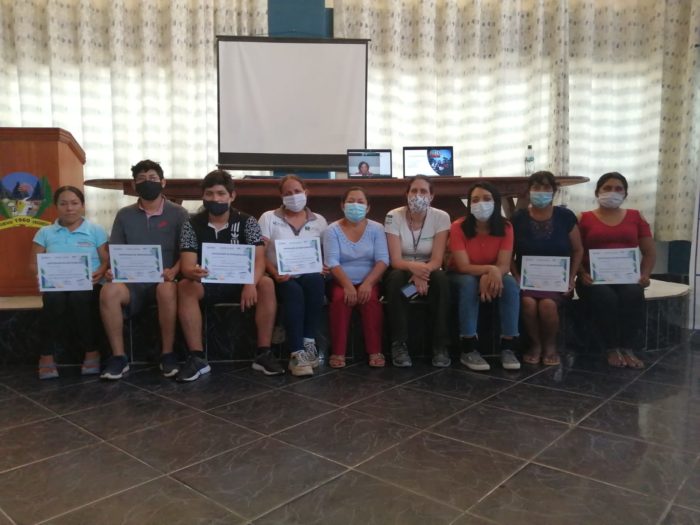
COVID-19-related government restrictions on mobility have impacted farming in Peru by interrupting the supply of agricultural inputs in rural areas, including in the regions where NCBA CLUSA’s USAID-funded Farmer-to-Farmer Program operates. Last year, farmers and cooperatives were unable to hire temporary workers from other towns to assist them in harvesting and pruning due to a disruption in transportation services. Additionally, farmers limited their visits to their farms to prevent contagion in spite of fears that missing out on regular fertilizing and pruning activities would lead to low production in 2021 and possibly 2022.
Restrictions on mobility also prevented farmers from transporting their cacao bean harvest to cooperatives to sell. Middlemen saw this situation as an opportunity to buy cacao beans from farmers at a deflated price. In order to avoid further exploitation from middlemen, cooperatives have had to negotiate extensions with their clients in order to fulfil contracts and adapt to the operational challenges brought on by COVID-19.
In Tocache, San Martín region, Peru, the Tocache Agroindustrial Cooperative (or CAT by its Spanish abbreviation), a cooperative of cacao producers with clients in Switzerland, Belgium, and France, collected cacao beans from farmers in their community. Founded in 1990 with 127 members Cooperative Agroindustrial Tocache Ltd (CAT) now has over 300 members who grow and sell cacao for national and international markets. Their introduction to international markets has increased their awareness of sustainable farming and well-established post-harvest processes. They also carried out campaigns to remind farmers that clients will respect the higher prices negotiated in their contracts, as opposed to the lower prices offered by middlemen through more informal mechanisms. However, CAT’s efforts were not completely successful because farmers needed quick money to take care of their families and afford expenses brought on by lifestyle changes during the pandemic.
CAT has also implemented a new strategy to improve its members‘ organic production during the ongoing economic crisis brought on by COVID-19. This strategy was introduced in 2020 and aims to address organic production challenges, such as extreme weather and plagues, through the development of a sustainable organic farm management program in which 415 of its members will be trained to understand and master the linkage between organic soil matter and crop, animal, and human health. The outcomes CAT seeks include strategic use of natural resources, reduced production costs, and improved health.
CAT has developed manuals on sustainable and organic production to use during trainings. Agricultural extensionists have carried out virtual trainings, which have also helped to develop the digital literacy skills of members eager to attend these trainings. Despite these efforts, CAT does not have a large enough membership base to meet the labor and input demands necessary to transition to sustainable organic farming.
CAT is looking forward to working with a volunteer from NCBA CLUSA’s USAID-funded Farmer-to-Farmer program to address the challenges they have faced in implementing their farm management program. CAT hopes that the volunteer can expand its members’ knowledge on post-harvest practices and assist them in implementing organic farming practices. CAT’s plan is to acquire small drying planks in 2021 for farmers to move fermented beans in a timely manner to be dried. They expect that with this assistance, members will be able to increase their production of high-quality dry cacao beans and could be paid up to 12 soles per kilo. The cooperative considers the assistance of a Farmer-to-Farmer volunteer necessary to improve and standardize sustainable organic farming practices.
Farmer-to-Farmer hosts, like CAT, look forward to receiving volunteers to help them achieve their social and economic goals as cooperatives. While the COVID-19 pandemic has impacted farming in Peru, cooperatives and producer groups are hopeful that they can resume activities soon, in collaboration with expert volunteers, to improve their production, increase their sales, and strengthen their organizations.
NCBA CLUSA is currently seeking 2 (1- US volunteer and 1- volunteer based in Peru) qualified Farmer-to-Farmer volunteer candidates for the position of Cacao Post-Harvest Expert to support Cooperative Agroindustrial Tocache Ltd (CAT) based in Tocache, Peru. CAT is updating the harvest and post-harvest protocols to increase the quality of cacao beans and reduce contamination risks. The Cacao Post-Harvest Experts are expected to provide guidance to help the cooperative improve their drying and fermentation process.


